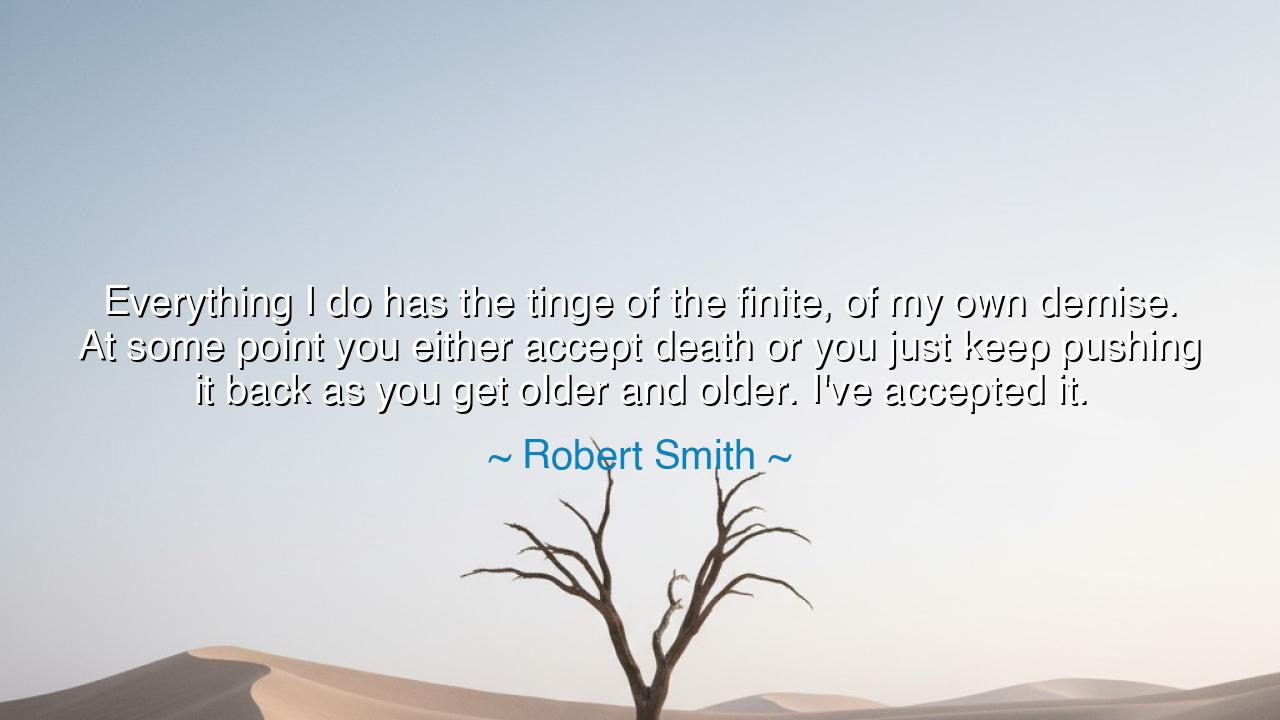
Everything I do has the tinge of the finite, of my own demise. At
Everything I do has the tinge of the finite, of my own demise. At some point you either accept death or you just keep pushing it back as you get older and older. I've accepted it.






"Everything I do has the tinge of the finite, of my own demise. At some point you either accept death or you just keep pushing it back as you get older and older. I've accepted it." — thus spoke Robert Smith, the melancholic poet of sound, whose music often trembles between darkness and devotion. In these words, he unveils a truth both grave and luminous: that to live fully, one must learn to live with the shadow of death. The finite, far from being a curse, gives meaning to our every act. For in acknowledging that all things end, we learn to see the beauty in their fleetingness. To accept death is not to surrender to despair, but to awaken to the sacred urgency of life itself.
The meaning of Smith’s reflection lies in the paradox that mortality is both the source of sorrow and the seed of purpose. He recognizes that every gesture — every song, every kiss, every heartbeat — is tinged with the awareness of impermanence. We are all moving toward an inevitable silence, and yet, that very truth is what makes our voices so precious. Many resist this awareness, seeking distraction, chasing youth, denying the slow approach of the end. But such denial only deepens fear. Smith’s wisdom lies in his calm acceptance: the courage to look death in the eye and live, not in spite of it, but because of it.
The origin of these words can be traced to the philosophy woven through Smith’s life and art as the frontman of The Cure. His songs — “Pictures of You,” “Disintegration,” “The End of the World” — are hymns to transience, exploring the beauty and ache of things that cannot last. Throughout his career, he has balanced light and darkness, love and loss, never fleeing from the shadows but instead finding poetry within them. His acceptance of death is not morbid resignation, but creative freedom. To him, mortality is not an enemy to fight, but a mirror that reflects life’s true shape — delicate, ephemeral, and utterly human.
This truth has echoed through the ages. Consider Marcus Aurelius, the philosopher-emperor of Rome, who meditated daily on his own death. “You could leave life right now,” he wrote, “Let that determine what you do and say and think.” Like Robert Smith, Aurelius understood that accepting mortality brings clarity to existence. It teaches one to act with kindness, to cherish the present, and to free the mind from vanity. Where others flee from death in fear, the wise meet it as a companion — not morose, but instructive. The awareness of our end sharpens our vision, reminding us that love, beauty, and truth matter only because they are fragile.
Smith’s acceptance also reveals a deeper spiritual courage. To acknowledge death is to confront the mystery that defines human life. Every culture, every faith, has sought to understand it — yet none can claim to master it. In ancient Egypt, the pharaohs built pyramids to defy time; in medieval Europe, monks carved skulls into their rosaries to remember their mortality. And in the modern world, artists like Smith carry forward that same meditation — stripping away illusion to face the finite nature of being. He reminds us that to live authentically, one must walk hand in hand with the awareness of ending, for only then can one truly savor the moment.
There is also tenderness in his acceptance. By saying “everything I do has the tinge of my own demise,” Smith reveals not fear, but intimacy — a recognition that death walks beside him as a silent muse. This awareness does not paralyze him; it deepens his empathy, his art, his love. Those who live in denial often live shallowly, chasing escape. But those who accept their limits, as Smith has, live deeply, seeing in every sunset a reflection of their own brief flame. In that knowledge lies peace. For to accept death is to discover that life itself — fragile, trembling, beautiful — is enough.
The lesson we draw from Smith’s words is this: do not flee from the thought of death, but let it teach you how to live. Speak kindly, for your words are finite. Create boldly, for your time is short. Love fiercely, for tomorrow is never promised. Do not waste your days pushing away what is inevitable; instead, use the knowledge of your mortality to fill your moments with meaning. When you understand that everything ends, you stop waiting to begin.
And so, O listener, remember the wisdom of Robert Smith: the shadow of death is not your enemy, but your teacher. To accept the finite is to be free from fear. Live with the awareness that each breath is borrowed, and in that fragile breath, pour your love, your art, your truth. For when you finally make peace with death, life, in all its fleeting brilliance, will at last belong wholly to you.






AAdministratorAdministrator
Welcome, honored guests. Please leave a comment, we will respond soon